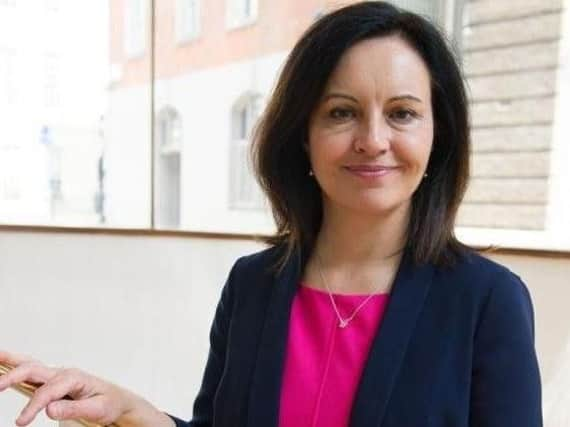Doncaster MP who lost mum to alcoholism calls for more help for children of chronic drinkers


Don Valley MP Caroline Flint spoke of the pain of watching her mother Wendy lose her battle with the bottle on yesterday's Andrew Marr show on BBC1 and is spearheading a drive for children of alcoholics to be given more help.
She has warned that the needs of young people are too often being overlooked in strategies designed to tackle alcohol addiction, as a new report highlights a “shocking” lack of support for the country’s 2.5 million children of alcoholic parents.
Advertisement
Hide AdAdvertisement
Hide AdShe has called for children affected by the issue to be given a “voice” by Government to help them avoid the shame and secrecy that she and others like her have endured.
Her comments coincide with the release of a new manifesto which reveals the “shocking picture of support for children of alcoholics” in the UK, including a lack of local strategies and insufficient funding in many areas.
The document, drawn up by a cross-party group of peers and MPs, calls on the Government to take urgent action in order to protect Britain’s estimated 2.5m “innocent victims of drink”.
According to the latest NHS figures, around 9 per cent of adult men in England and roughly 4 per cent of women show signs of alcohol dependence.
Advertisement
Hide AdAdvertisement
Hide AdThis can have consequences for an individual’s health, social and economic wellbeing, with alcohol-related mortality at its highest among those from disadvantaged backgrounds.
The new Children of Alcoholics: Manifesto for Change suggests that around one in five children in the UK currently lives with a parent who drinks too much.
It claims that these children are twice as likely to experience difficulties at school, three times more likely to consider suicide and four times more likely to become alcoholics themselves as a result.
However, despite these increased risks, the report found that at least 138 local authorities in the UK do not have a strategy in place to support these children, and a number are seeing their addiction treatment budgets cut.
Advertisement
Hide AdAdvertisement
Hide AdIt also found that the number of people accessing alcohol treatment varies widely from authority to authority, and there is “little uniformity” in the way that local bodies collect data around alcohol misuse
It therefore sets out 10 recommendations for the Government to help “break the cycle” of addiction and end the stigma experienced by children of addicts.
These include the creation of a new national strategy, increased availability of support for families battling alcohol problems, and better education and awareness of the problem for children.
Ms Flint, who is vice chairman for the All-Party Parliamentary Group that published the manifesto, said she hoped the document would “give children a voice”.
Advertisement
Hide AdAdvertisement
Hide AdSpeaking on ITV’s Good Morning Britain she explained that “too often, in all the strategies that are put together, children’s voices aren’t heard”.
“I and others who are part of the manifesto want to try and allow our experience to give some voice to those children who are out there today,” she said.
“Hopefully Government will listen to them.”
She went on to speak of the “secrecy and the shame” that she felt about her own mother’s struggle with addiction, and the fear some children feel “about being taken away” if other people find what is happening at home.
“I found it very difficult to talk about this publicly until I was in my 40s it was about that secrecy and not wanting to tell anyone,” she said. “I think as I’ve grown older and found it easier in some ways to talk about this and to talk to others who have been through the same experience.”
Advertisement
Hide AdAdvertisement
Hide AdIn an interview in 2015, she opened up about the “shame” of Wendy's fatal addiction - and the “chaos” it created in the household.
She said her mum found comfort in alcohol, swigging “what she could afford” while Ms Flint was then a teenager.
“You go to school and you try to get on with things, but you’re never quite sure what you’re going to come home to,” she said.
“There’s a lot you do as a child to keep things private.”
She feared what pals would say if they discovered the family’s secret.
Advertisement
Hide AdAdvertisement
Hide Ad“You’re ashamed about it, you’re worried about people finding out, you’re worried what people will think of your mum, you’re worried what people will think of you, you’re worried about what’s happening to your brother and sister - and obviously you’re worried about your mum and what she might do when the drink takes hold,” she said.
“For any children going through this, it’s a mixed emotion because you can go through love and hate in 24 hours, and you just don’t know from one day to the next what emotions you’re going to be feeling.”
Twenty-five years since Wendy’s death, Ms Flint only drinks socially and never by herself.
“I never drink alone,” she says. “If I drink alcohol, I drink with my friends and husband socially - not that I think I’m going to go off the rails or anything, but I don’t want to be that person who takes refuge in alcohol on your own, because that’s when it does take a grip.
“For me, that is my line. That, for me, is just a no-no.”